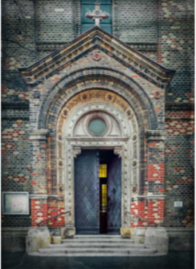By Aiden Carroll

If Jean Valjean came knocking at the door, would you answer?
We all know the classic moment: Valjean, the criminal-turned-hero protagonist of Victor Hugo’s Les Miserables, is turned away from every door, only to be welcomed by the Bishop of Digne. It’s a touching scene of acceptance, compassion, and forgiveness.
Hugo’s novel is world-renowned for its reflections on human nature and compassion. Bishop Myriel’s ideas of forgiveness and devotion ring true today, inspiring both religious and secular activism.
Europe and America could take a few notes from the Bishop.
For context: Syria has been entangled in a civil war for just over six years. During that time, millions of Syrians have been displaced within the country due to violence, and some have even been forced to seek refuge beyond Syria.
If the world wants the Syrian Refugee Crisis to end, it’s necessary to take a chance and open borders to all; otherwise, suffering will continue indefinitely.
As Syria’s infrastructure further deteriorates, Syrians are fleeing the war-torn nation in greater numbers, placing increased strain on neighboring countries. Many European countries have openly refused to take in refugees, citing population overload and culture clash as key factors in the decision. Nations can no longer support their population due to limited resources. Refugees are seen as a burden. Acts of xenophobic terrorism plague Europe, and fingers are quickly pointed at outsiders.
Jean Valjean’s journey as an outcast parallels the situation of these refugees. If being a prisoner is Valjean’s handicap in society, then refugee status is the modern equivalent. Refugees are refused service, harassed, and worse. In the same way that Valjean was turned away at every door, these refugees are ostracized within–if not altogether barred from–the haven they need.
Just as Valjean’s suffering came to an end with the Bishop, so too must the Syrian Refugee Crisis end through compassion. The Bishop believes that the door of a priest should always be open, regardless of circumstance. Similarly, nations should be receptive to all; after all, what difference does nationality make upon our DNA? Aren’t we all human?
Often, an argument against refugee acceptance skirts around the issue of religion.The Prime Minister of Slovakia openly denied refugees on the basis that, as a Christian country, Slovakia could not accept Muslims because the country did not have any mosques. Not only is this a sweeping generalization fueled by xenophobic anxiety, but it is further evidence of refugees being turned away in their hour of need.
Bishop Myriel saves Jean Valjean out of compassion, not piety. After all, compassion is not specific to Christianity: the Quran stresses service to others, while Hinduism cites daya (compassion) as empathizing with those who suffer. The Dalai Lama even testifies that compassion is the root of all personal happiness.
Christianity was born of humanity, not the other way around. Empathy should transcend nations as it does religions.
This solution isn’t perfect. It would be wrong to argue that, with the opening of borders to refugees, suffering would end altogether. Nations would feel strained in supporting populations due to an influx in immigration. Higher population density would lead to overcrowding and discomfort at the macro-social level.
However, suffering is not an absolute feeling so much as a state of being.
In his essay “Destroying Poverty”, Hugo argues that, while poverty can be eliminated, suffering cannot. Although we can’t wipe out human suffering, we can destroy the institutions that lead to this injustice. Just as the miserables of French society withstood the agony of poverty while the bourgeois looked on, Syrian refugees are currently experiencing the agony of vagrancy while the world stands by. By allowing refugees to enter havens, however, this suffering will shift from having a drastic effect on one small group to having a minimal effect on a larger community.
Suffering can be diffused, dissipated, but never destroyed. In other words, we can weather the storm, but only together.
According to Herbert Kretzmer, the english lyricist of the musical adaptation of Les Miserables, the bourgeois needed to “look down”: now, it’s time to look beyond. It is necessary for nations to put aside their hesitation, prejudice, and fear in the name of humanity. To look beyond borders, whether national, religious, or social, and see a human being.
These people are begging for a safe haven, and have been denied at every turn. We have the power to end their suffering.
When you hear a knock at your door, what will you do?
